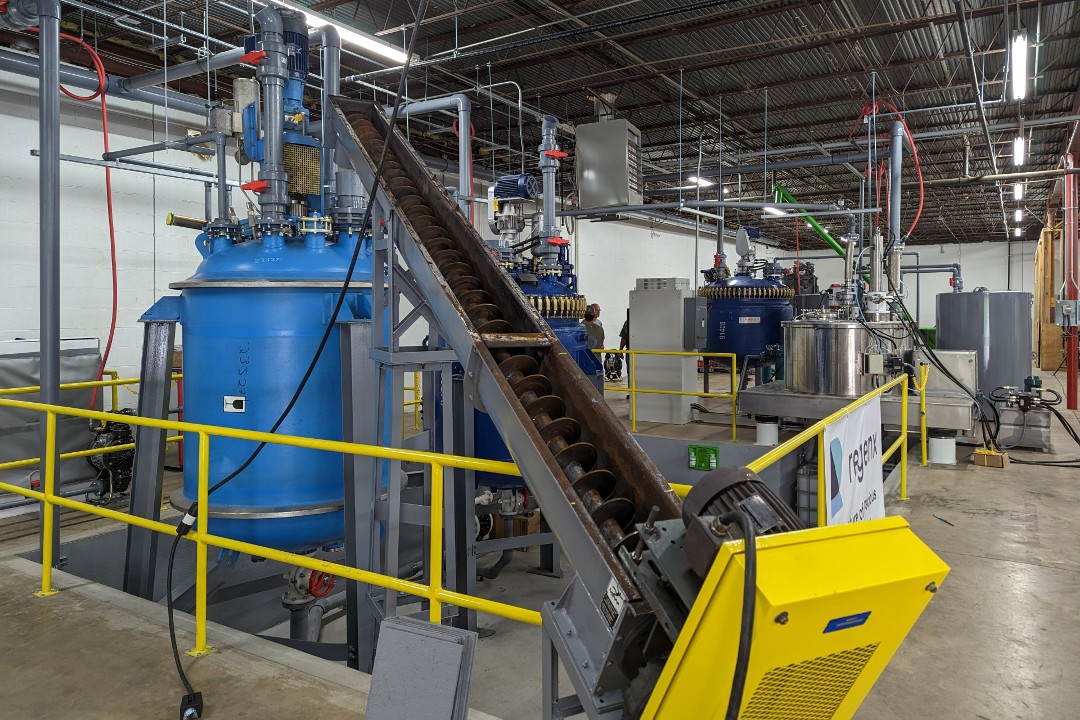A former mining company based in St. Albert has secured $2.1 million in financing to continue its pivot toward recovering precious metals from catalytic converters in the U.S.
Regenx Tech is commissioning the first of four modules comprising its 30,000-square-foot facility in the town of Greeneville, Tenn. When all four modules are operational, the plant will process 10 tonnes of diesel catalytic converters per day, recovering platinum and palladium from the devices and transforming what's left into industrially useful materials, using proprietary clean technology.
"We have a net-zero environmental impact — nothing in the air or water, and the waste material produced is used for other industrial purposes," said CEO Greg Pendura told Taproot.
As part of its transformation from a miner of tin and tantalum (a corrosion-resistant metal) to a company that recovers already-mined materials, Regenx delisted its securities from the TSX Venture Exchange and transitioned to the Canadian Securities Exchange on June 23. That makes it easier to position itself as a technology company instead of a mining one.
The company announced on June 30 that it raised $2.1 million by issuing debentures that can be converted into equity in 2025. It intends to use the money to further the first module of its catalytic converter facility and for general working capital.
In an interview earlier this year, Pendura said the plant will be the first to recover precious metals from diesel catalytic converters without smelting, an extraction process that creates harmful emissions and waste products. In recent years, smelting operations have grown reluctant to process diesel catalytic converters because they contain higher volumes of silicon carbide, a chemical compound that creates problems in smelting machinery.
As a result, about $21 billion of platinum and palladium goes unclaimed each year, Pendura said, despite a worldwide shortage of these precious metals. Platinum Group Metals (PGMs) — a family of metals that include platinum, palladium, rhodium, and others — are in high demand by the automotive industry, which uses them for catalytic converters, but also fuel cells, gasoline refining, anti-lock braking systems, engine management systems, and spark plugs.

A reactor at a Tennessee plant where Regenx will use its proprietary technology to extract platinum and palladium from diesel engine catalytic converters without the use of smelting. (Supplied)
Precious platinum and palladium
PGMs are mined around the world — in fact, Canada ranks third in palladium production and fourth in platinum — but mining operations are not keeping up with global demand. Even with recycling programs currently providing about one-third of the global PGM supply, this year the platinum deficit is expected to reach 1 million ounces and the palladium deficit 200,000 ounces. For perspective, the market price of platinum and palladium are approximately US$1,000 and US$1,400 per ounce respectively.
Pendura said Regenx is well-positioned to take advantage of the market opportunity thanks to its novel technology — developed at its Vancouver lab over the course of about three-and-a-half years — as well as the geographical location of its first plant. "Tennessee is a very important transportation hub in the US," he said.
Tennessee is also the home state of Davis Recycling, with whom Regenx has partnered.
"They're supply chain management experts in that field and they've been recycling for 25 years," said Pendura. "This will enable us to get an ongoing stream of feedstock at reasonable prices."
In addition to gathering a large supply of used-up catalytic converters from diesel engines, Davis Recycling Inc. will grind up the devices to enable Regenx to process the precious metals.
"It takes the risk away from what we're doing because we don't have to learn how to become expert recyclers in the US," Pendura added.
Opportunity knocks
Regenx grew out of a junior mining company called Mineworx Technologies, which mined tin and tantalum at a site in Spain before selling the asset in 2022. Initially, the company had planned to pivot to manufacturing greener mining equipment, but then saw an untapped market in diesel catalytic converters.
The timing of the new plant coincides not only with favourable market forces but also a legislative crackdown on catalytic converter supply chain management following a 1,215% rise in thefts between 2018 and 2022. (Canada has seen similar challenges.)
Dozens of states have either passed laws or introduced legislation to curb the thefts, and a proposed federal bill — the Preventing Auto Recycling Thefts (PART) Act — would require catalytic converters to be marked with a traceable identification number.
Increased regulations will require recyclers to retain proof of where their catalytic converters have come from, decreasing the likelihood of stolen goods being purchased, said Pendura: "There will be fewer outlets in the future for pirated diesel catalytic converters."
He noted that Davis Recycling Inc., not Regenx, will be responsible for any paperwork pertaining to chain-of-custody, but he notes that greater regulations are likely to benefit the operation rather than harming it.
"Actually, it will make more inventory available because most of the time the pirated stuff goes offshore," he said.
Initially, the plant will source feedstock from the 13 states in which Davis Recycling Inc. operates, but over time, the project will expand to the west coast and elsewhere in the country. Pendura anticipates building two more processing facilities in the U.S. before expanding into Canada.
"There's ample feedstock in Canada as well, but our business partner is (in the U.S.)," he said. "You have to have that supply chain management side of the business taken care of and Davis Recycling does that. So, once we have that network in place, then we'll look at further expansion."
